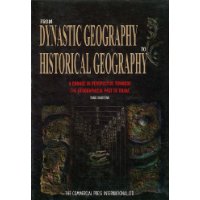| 商家名称 |
信用等级 |
购买信息 |
订购本书 |
|
|
 |
从王朝地理到历史地理 |
 |
|
 |
从王朝地理到历史地理 |
 |

基本信息·出版社:商务印书馆国际有限公司
·页码:182 页
·出版日期:2000年01月
·ISBN:7801031997
·条形码:9787801031990
·版本:第1版
·装帧:精装
·开本:32
·正文语种:英语
内容简介 《从王朝地理到历史地理》讲述了:Therefore too, if and when thatdefinition shifts ground —— if and when "our place in the world" be-gins to change, it can be the equivalent of an earthquake leaving inits wake the rubble of centuries and, for the survivors, either thepossibility of rebuilding some new combination of places, or migrat-ing to safer ground. Naturally, such earthquakes are not everydayoccurrences and, normally, their impact is only local. They tend tooccur only at moment when, rather like the tectonic forces of theearth's plated themselves, two self- definitions come into directconflict and one is forced to give way (space) to the other.
编辑推荐 《从王朝地理到历史地理》是唐晓峰编著的,由商务印书馆国际有限公司出版。
目录 Preface
Acknowledgments
Chapter 1 Introduction
The Modernization of Historical Geography
On the History of Geography: Theoretical Considerations
Western Influence and Chinese Inherence
Studies on the History of Geography of China
The Modern Historical Geography in China: Question
The Structure of This Study
Chapter 2 Confucian Geography: The Tradition
The Setting of Confucian Geography
The Harmonious Order of the Land
An Official Geography (Geography as Political Power)
A Moral and Ritual Geography (Geography as the Demonstration of Humanity)
A Transcendental Geography (Geography as a Part of Cosmology)
An Historical Geography (Geography as the Identity of Place)
Chapter 3Geography in the Qing Dynasty: The Dynastic Geography
The Separation of Geography from Cosmology
The Evidential Research Movement and Geography
The Flourishing of "Yan-Ge 1)i-Li"
Chapter 4 The Early Twentieth Century: TheTime of Change
The Collapse of the Concept of "Central Kingdom"
The Dissemination of Social Darwinism
The Veneration of "Mr. Science"
The National Studies Movement
The Emergence and Limitation of the Modern Geography
Chapter 5 Gu Jiegang: The New Dynastic Geography (1)
The Power of Geography in Gu Jiegang's Historiography "Gu Di Bian": A Critique of Ancient Geography
The Organization of the Yu Gong Society
Chapter 6 Yu Gong Society : The New Dynastic Geography (2)
The Role of the Yu Gong Society
The Achievements of the Journal
The Problem of Theory
Chapter 7 The Study of Hou Renzhi: Historical Geography
The Theoretical Basis for Historical Geography Criticism of Yan-ge Di-li
Hou's Critiques of Dynastic Geography
Hou's Concern with the Meaning of Landscape
Traditional Values of the Modern Scholar
Chapter 8 Conclusion Tradition and Modernity
The Contribution of Historical Geography A Remaining Dilemma
Bibliography
Glossary
……
序言 Any society or culture, Chinese or Western, ancient or mod-ern, rests its laurels on some prevailing self- definition mediatedthrough time (history) and defined in space (geography). What weonce pompously called "weltanschauung" or"worldview", and whatgeographers call our "cognitive map" is just another way of describ-ing that self- definition. So too are our traditional maps —— thosetwo dimensional, graphic representations of commonly——agreed def-initions of where we are. In other words too, whatever else wemight be, we are known to others and among ourselves by the waywe define our "place in the world". Therefore too, if and when thatdefinition shifts ground —— if and when "our place in the world" be-gins to change, it can be the equivalent of an earthquake leaving inits wake the rubble of centuries and, for the survivors, either thepossibility of rebuilding some new combination of places, or migrat-ing to safer ground. Naturally, such earthquakes are not everydayoccurrences and, normally, their impact is only local. They tend tooccur only at moment when, rather like the tectonic forces of theearth's plated themselves, two self- definitions come into directconflict and one is forced to give way (space) to the other.Throughout human history this has usually occurred when two cul-tures go "head——to——head" in mortal combat and again, normally,the consequences are only local or regional. But, what happenswhen such earthquakes are supernova——like in that they send shock-waves around the globe, destroying not only one parochial history atthe epicenter, but also transforming the history of the world itself?
One such massive earthquake is represented by the story thatunfolds in the following study —— the collapse of China's so——called"traditional" or "Confucian" elite definition of itself and its place inthe world, and the rebuilding of that sense of place in modern China.
文摘 This sense of distance from Chinese tradition was exacerbatedby other factors in early 20th century China. As a result of four fac-tors (the growth of scientism, the end of the traditional examina-tion system, the breakup of many traditional educational institutionstied to the Qing monarchy, and the messy state of Republican poli-tics), intellectuals were encouraged to see themselves as existing in-dependently from the political authorities. No longer able to attachthemselves to some political power, as they had in the past, intellec-tuals often lost their sense of their place in society; as a result, theybecame highly self-centered and individualistic.
It was obviously hard for intellectuals to come to terms withthe new political situation, given the bleak political and social reali-ties that emerged from the 1911 Revolution. Many intellectuals con-vinced themselves that it was pointless to try to fashion politicalchanges before they had established a solid foundation in Chineseculture for the transformation of Chinese society. Therefore Hu Shiurged his compatriots, "not to talk about politics for twentyyears. "Many scholars, in trying to build a nonpolitical foundationfor a new China through scientific studies aimed at reforming Chi-nese society, stressed the importance of intellectual and culturalchange over political, social, and economic changes. Their worshipof the Western scientific spirit tended to reinforce their belief that itwas only objective truth, rather than political power, that should beserved. When these scholars felt the need for organizations, theypreferred academic associations to political parties.Scholars likeDing Wenjiang, Hu Shi, Cai Yuanpei, and Gu Jiegang had nostrong partisan political identification then. Most of their energieswere devoted either to the New Culture movement or to the organi-zation of new academic associations. The Yu Gong society, whichwould become the center of the movement for a new dynastic geog-raphy, was a typ
……




